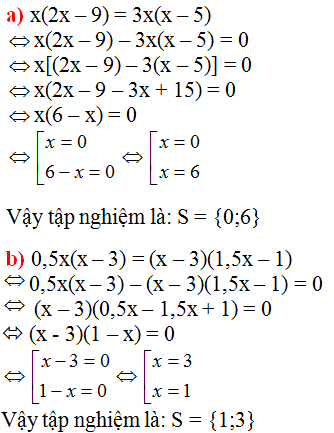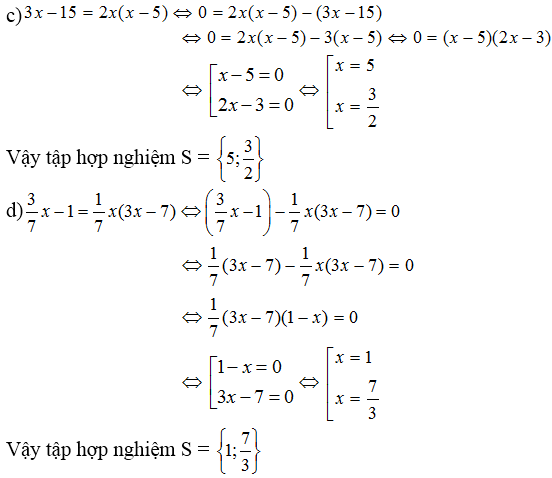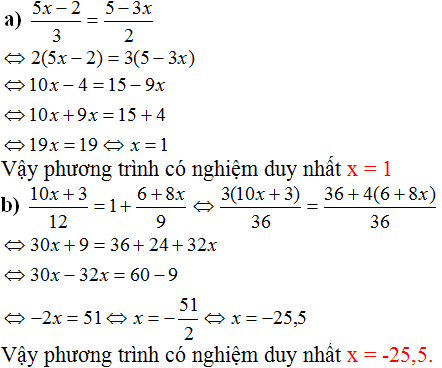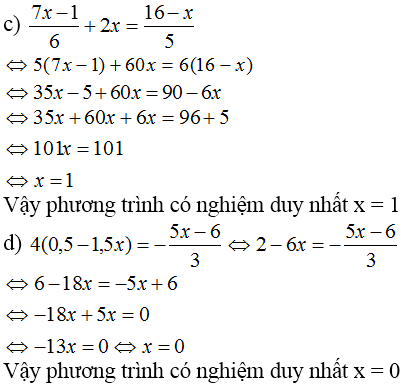
Hãy nhập câu hỏi của bạn vào đây, nếu là tài khoản VIP, bạn sẽ được ưu tiên trả lời.


a: \(\Leftrightarrow\left\{{}\begin{matrix}x< =\dfrac{3}{2}\\\left(\dfrac{1}{2}x\right)^2-\left(2x-3\right)^2=0\end{matrix}\right.\Leftrightarrow\left\{{}\begin{matrix}x< =\dfrac{3}{2}\\\left(\dfrac{1}{2}x-2x+3\right)\left(\dfrac{1}{2}x+2x-3\right)=0\end{matrix}\right.\)
\(\Leftrightarrow\left\{{}\begin{matrix}x< =\dfrac{3}{2}\\\left(3-\dfrac{3}{2}x\right)\left(\dfrac{5}{2}x-3\right)=0\end{matrix}\right.\Leftrightarrow x\in\left\{\dfrac{6}{5}\right\}\)
b: \(\Leftrightarrow\left\{{}\begin{matrix}x>=-\dfrac{4}{3}\\\left(3x+4\right)^2-\left(2x\right)^2=0\end{matrix}\right.\Leftrightarrow\left\{{}\begin{matrix}x>=-\dfrac{4}{3}\\\left(5x+4\right)\left(x+4\right)=0\end{matrix}\right.\)
\(\Leftrightarrow x=-\dfrac{4}{5}\)
c: \(\Leftrightarrow\left\{{}\begin{matrix}x>=12\\\left(5x-x+12\right)\left(5x+x-12\right)=0\end{matrix}\right.\Leftrightarrow\left\{{}\begin{matrix}x>=12\\\left(4x+12\right)\left(6x-12\right)=0\end{matrix}\right.\)
hay \(x\in\varnothing\)
d: \(\Leftrightarrow\left\{{}\begin{matrix}x>=-\dfrac{10}{3}\\\left(2,5x-1,5x-5\right)\left(2,5x+1,5x+5\right)=0\end{matrix}\right.\)
\(\Leftrightarrow\left\{{}\begin{matrix}x>=-\dfrac{10}{3}\\\left(x-5\right)\left(4x+5\right)=0\end{matrix}\right.\Leftrightarrow x\in\left\{-\dfrac{5}{4};5\right\}\)

a: \(\Leftrightarrow\left\{{}\begin{matrix}x>=\dfrac{2}{3}\\\left(3x-2-2x\right)\left(3x-2+2x\right)=0\end{matrix}\right.\Leftrightarrow\left\{{}\begin{matrix}x>=\dfrac{2}{3}\\\left(x-2\right)\left(5x-2\right)=0\end{matrix}\right.\)
hay x=2
b: \(\Leftrightarrow\left\{{}\begin{matrix}x>=-\dfrac{10}{3}\\\left(-3,5x-1,5x-5\right)\left(-3,5x+1,5x+5\right)=0\end{matrix}\right.\)
\(\Leftrightarrow\left\{{}\begin{matrix}x>=-\dfrac{10}{3}\\\left(-5x-5\right)\left(-2x+5\right)=0\end{matrix}\right.\Leftrightarrow x\in\left\{-1;\dfrac{5}{2}\right\}\)
c: \(\Leftrightarrow\left\{{}\begin{matrix}x>=\dfrac{1}{3}\\\left(3x-1-x-15\right)\left(3x-1+x+15\right)=0\end{matrix}\right.\)
\(\Leftrightarrow\left\{{}\begin{matrix}x>=\dfrac{1}{3}\\\left(2x-16\right)\left(4x+14\right)=0\end{matrix}\right.\Leftrightarrow x=8\)
d: \(\Leftrightarrow\left|x-2\right|=0,5x-4\)
\(\Leftrightarrow\left\{{}\begin{matrix}x>=8\\\left(0,5x-4-x+2\right)\left(0,5x-4+x-2\right)=0\end{matrix}\right.\)
\(\Leftrightarrow\left\{{}\begin{matrix}x>=8\\\left(-0,5x-2\right)\left(1,5x-6\right)=0\end{matrix}\right.\Leftrightarrow x\in\varnothing\)

a) \(\dfrac{x}{3}-\dfrac{2x+1}{2}=\dfrac{x}{6}-x\)
\(\Leftrightarrow\dfrac{2x}{6}-\dfrac{3\left(2x+1\right)}{6}=\dfrac{x}{6}=\dfrac{6x}{6}\)
\(\Leftrightarrow2x-3\left(2x+1\right)=x-6x\)
\(\Leftrightarrow2x-6x-3=x-6x\)
\(\Leftrightarrow2x-6x-x+6x=3\)
\(\Leftrightarrow x=3\)
\(S=\left\{3\right\}\)
b) \(\dfrac{2+x}{5}-0,5x=\dfrac{1-2x}{4}+0,25\)
\(\Leftrightarrow\dfrac{4\left(2+x\right)}{20}-\dfrac{10x}{20}=\dfrac{5\left(1-2x\right)}{20}+\dfrac{5}{20}\)
\(\Leftrightarrow4\left(2+x\right)-10x=5\left(1-2x\right)+5\)
\(\Leftrightarrow8+4x-10x=5-10x+5\)
\(\Leftrightarrow4x-10x+10x=5+5-8\)
\(\Leftrightarrow4x=2\)
\(\Leftrightarrow x=\dfrac{1}{2}\)
\(S=\left\{\dfrac{1}{2}\right\}\)

\(a,\)\(2x+3>5\)
\(\Rightarrow2x>5-3\)
\(\Rightarrow2x>2\)
\(\Rightarrow x>1\)
\(\frac{3}{5}x+\frac{12}{15}< 0\)
\(\Rightarrow\frac{3}{5}x+\frac{4}{5}< 0\)
\(\Rightarrow3x+4< 0\)
\(\Rightarrow3x< -4\)
\(\Rightarrow x>\frac{-4}{3}\)

thực hiện các phép biến đổi để đưa các phương trình đã cho về các phương trình tương đương có dạng ax+b=0 hoặc ax=-b,ta được:
a)5x-2/3=5-3x/2⇔2(5x-2)=3(5-3x)⇔10x-4=15-9x⇔10x+9x=15+4⇔19x=19⇔x=1
phương trình có 1 nghiệm x=1

a/ ta có: 2(x+1)=3+2x
=> 2x +2 = 3+ 2x
=>2x-2x=3-2
=>0=1 (vô lí) =>đpcm
b/ 2(1-1,5x)+3x=0 =>2-3x+3x=0
=>0=-2 (vô lí ) =>đpcm
c/ vô nghiệm vì không có giá trị tuyệt đối nào mà kết quả là số âm

Câu 1a : tự kết luận nhé
\(2\left(x+3\right)=5x-4\Leftrightarrow2x+6=5x-4\Leftrightarrow-3x=-10\Leftrightarrow x=\frac{10}{3}\)
Câu 1b : \(\frac{1}{x-3}-\frac{2}{x+3}=\frac{5-2x}{x^2-9}\)ĐK : \(x\ne\pm3\)
\(\Leftrightarrow x+3-2x+6=5-2x\Leftrightarrow-x+9=5-2x\Leftrightarrow x=-4\)
c, \(\frac{x+1}{2}\ge\frac{2x-2}{3}\Leftrightarrow\frac{x+1}{2}-\frac{2x-2}{3}\ge0\)
\(\Leftrightarrow\frac{3x+3-4x+8}{6}\ge0\Rightarrow-x+11\ge0\Leftrightarrow x\le11\)vì 6 >= 0
1) 2(x + 3) = 5x - 4
<=> 2x + 6 = 5x - 4
<=> 3x = 10
<=> x = 10/3
Vậy x = 10/3 là nghiệm phương trình
b) ĐKXĐ : \(x\ne\pm3\)
\(\frac{1}{x-3}-\frac{2}{x+3}=\frac{5-2x}{x^2-9}\)
=> \(\frac{x+3-2\left(x-3\right)}{\left(x-3\right)\left(x+3\right)}=\frac{5-2x}{\left(x-3\right)\left(x+3\right)}\)
=> x + 3 - 2(x - 3) = 5 - 2x
<=> -x + 9 = 5 - 2x
<=> x = -4 (tm)
Vậy x = -4 là nghiệm phương trình
c) \(\frac{x+1}{2}\ge\frac{2x-2}{3}\)
<=> \(6.\frac{x+1}{2}\ge6.\frac{2x-2}{3}\)
<=> 3(x + 1) \(\ge\)2(2x - 2)
<=> 3x + 3 \(\ge\)4x - 4
<=> 7 \(\ge\)x
<=> x \(\le7\)
Vậy x \(\le\)7 là nghiệm của bất phương trình
Biểu diễn
-----------------------|-----------]|-/-/-/-/-/-/>
0 7

a) chưa học :v
b) \(\frac{x-1}{x-3}>2\)ĐKXĐ : \(x\ne3\)
\(\Leftrightarrow x-1>2\left(x-3\right)\)
\(\Leftrightarrow x-1>2x-6\)
\(\Leftrightarrow x-1-2x+6>0\)
\(\Leftrightarrow-x+5>0\)
\(\Leftrightarrow x>5\)( thỏa mãn ĐKXĐ )
Vậy....
a) Dùng bảng xét dấu xem sao (tự lập):v
+)Với \(x< -\frac{3}{2}\);phương trình trở thành:
\(x+3=x-1\Leftrightarrow0=-4\) (vô lí,loại)
+)Với \(-\frac{3}{2}\le x< 0\);phương trình trở thành:
\(-3x-3=x-1\Leftrightarrow4x=-2\Leftrightarrow x=-\frac{1}{2}\) (t/m)
+)Với \(x\ge0\);phương trình trở thành:
\(-x-3=x-1\Leftrightarrow2x=-2\Leftrightarrow x=-1\) (loại)
Vậy tập hợp nghiệm của phương trình: \(x=\left\{-\frac{1}{2}\right\}\)




0,5x(x – 3) = (x – 3)(1,5x – 1)
⇔ 0,5x(x – 3) – (x – 3)(1,5x – 1) = 0
⇔ (x – 3).[0,5x – (1,5x – 1)] = 0
⇔ (x – 3)(0,5x – 1,5x + 1) = 0
⇔ (x – 3)(1 – x) = 0
⇔ x – 3 = 0 hoặc 1 – x = 0
+ x – 3 = 0 ⇔ x = 3.
+ 1 – x = 0 ⇔ x = 1.
Vậy phương trình có tập nghiệm S = {1; 3}.